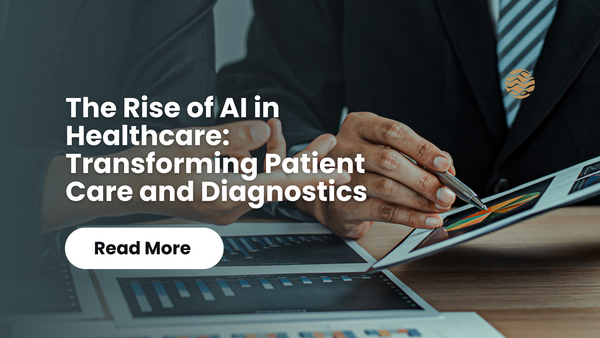Introduction:
Artificial Intelligence (AI) has revolutionized numerous industries, and healthcare is no exception. With its ability to process vast amounts of data, recognize patterns, and make intelligent decisions, AI is transforming patient care and diagnostics, leading to improved outcomes and better healthcare delivery. In this article, we will explore the rise of AI in healthcare, its impact on patient care and diagnostics, and share real-life experiences that highlight the potential of this technology. Additionally, we will sprinkle in some lighthearted jokes to keep the reading engaging. So, let's dive in!
AI's Role in Patient Care:
AI is augmenting healthcare providers' capabilities and improving patient care in various ways. One significant application is in diagnosis, where AI algorithms analyze medical images, such as X-rays and MRIs, with remarkable accuracy. By assisting radiologists in detecting abnormalities and identifying early-stage diseases, AI reduces diagnostic errors and facilitates faster treatment interventions.
Real-life Experience:
Dr. Smith, a radiologist, shares his experience with AI in diagnostics:
"I remember a challenging case where an X-ray image appeared normal to me, but the AI algorithm flagged a tiny abnormality. Upon closer examination, it turned out to be a lung nodule, which led to an early-stage lung cancer diagnosis. Thanks to the AI's assistance, we caught it early, and the patient underwent successful treatment."
Joke:
Why did the computer go to medical school? Because it wanted to become an AI surgeon and finally put its motherboard to good use!
AI-Driven Precision Medicine:
AI algorithms are helping healthcare professionals personalize treatment plans and predict patient outcomes. By analyzing patient data, including genetic information, medical history, and lifestyle factors, AI can identify patterns and recommend tailored treatment approaches. This shift towards precision medicine allows for more effective interventions and better patient outcomes.
Real-life Experience:
Sarah, a patient diagnosed with a rare genetic disorder, shares her experience with AI-driven precision medicine:
"After years of struggling with misdiagnoses, I underwent genomic sequencing. AI algorithms analyzed my genetic data, and based on their recommendations, my doctors prescribed a targeted medication. It has been life-changing! My symptoms have improved significantly, and I finally feel like we're on the right track."
Joke:
Why did the AI doctor have good bedside manners? Because it was programmed to always have a byte to eat before seeing patients!
Enhancing Healthcare Delivery:
AI-powered chatbots and virtual assistants are improving the accessibility and efficiency of healthcare services. Patients can receive immediate support, ask questions, and even receive preliminary diagnoses through these automated systems. This not only reduces the burden on healthcare providers but also enables patients to access healthcare guidance conveniently.
Real-life Experience:
John, a busy professional, shares his experience with an AI-powered chatbot:
"I had a minor health concern and didn't have the time to visit a doctor. I tried an AI-powered chatbot, and it provided me with a series of questions to assess my symptoms. Within minutes, I received advice on self-care measures and recommendations for further medical evaluation. It saved me time and gave me peace of mind."
Joke:
Why did the AI doctor become a comedian? Because it realized laughter is the best medicine, and it could generate jokes with perfect timing!
Conclusion:
The rise of AI in healthcare is transforming patient care and diagnostics, leading to improved outcomes, personalized treatments, and enhanced healthcare delivery. With its ability to process vast amounts of data, AI is revolutionizing the way healthcare professionals diagnose diseases, tailor treatments, and interact with patients. As AI continues to evolve, its impact on healthcare will only grow, ultimately benefiting patients worldwide. So, let's embrace the AI revolution and toast to a healthier future
https://community.greeka.com/users/seotorontoexperts
https://aulasvirtuales.zaragoza.unam.mx/cv/user/profile.php?id=267334
https://www.yelu.in/user/70560
https://dev.to/seotorontoexperts
http://rivr.sulekha.com/seo-toronto-experts_59920675



